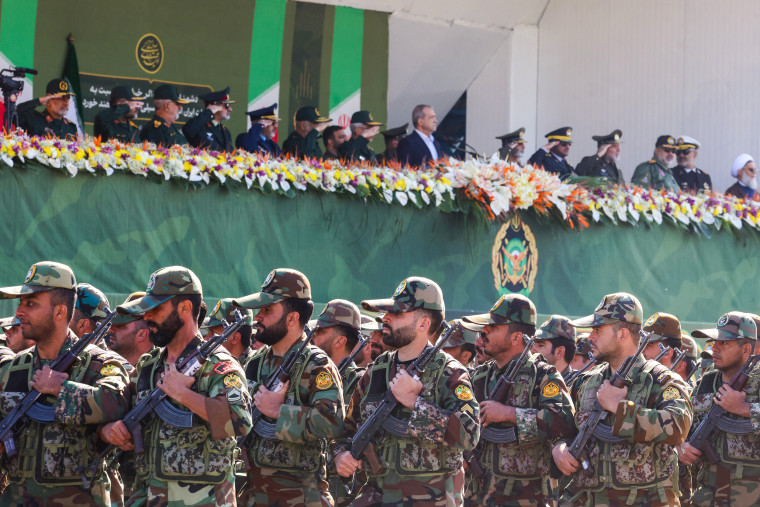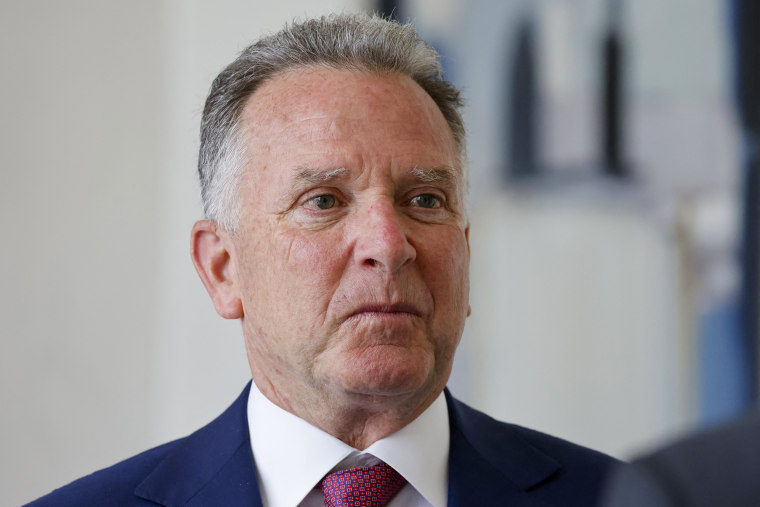Iran parades missiles through the streets in a show of force as nuclear talks ramp up

TEHRAN — On Army Day in Iran, the Islamic Republic displayed its military might, parading thousands of troops through the streets of the capital Tehran along with its S-300 missile defense system, drones and other military hardware.
Watched and praised by President Masoud Pezeshkian it was a very public show of force.
But behind the scenes Iran is pushing for diplomacy, Foreign Minister Sayyid Abbas Araghchi traveling to Moscow where he met with President Vladimir Putin, before sitting down for talks with his Russian counterpart Sergey Lavrov on Friday.
“Our Russian friends gave us the necessary information,” Araghchi was quoted as saying by Russia’s state-run TASS news agency after his meeting with Putin on Thursday.
He is scheduled to travel to Rome for talks with U.S. special envoy Steve Witkoff on Saturday where they are expected to resume talks about Tehran’s rapidly advancing nuclear program.

The pair met in Oman last Saturday and held the first round of talks between the two countries since President Donald Trump returned to the White House.
But while both sides described those talks as positive and constructive, Iran has said since that it has been confused over the mixed messaging by the Trump administration on whether it wants them to completely dismantle its entire nuclear program.
“The reality is, we are receiving contradictory and inconsistent messages from the United States,” Araghchi was quoted as saying in Moscow by the Iran’s Mehr news agency. “From our perspective, what matters is what is said at the (indirect and mediated) negotiation table.”
Witkoff had earlier suggested that Iran could enrich uranium to a cap of 3.6 percent, but then later walked it back, saying the complete abandonment of the program was the goal.
Were it to be capped at the level, it would have been in line with the 2015 nuclear deal, Iran signed with the five permanent members of the U.N. Security Council — the U.S., Russia, France, China and the United Kingdom — as well as Germany and the European Union.

Formally known as the Joint Comprehensive Plan of Action, it offered Tehran billions of dollars in sanctions relief in exchange for agreeing to curb its nuclear program.
But Trump pulled the U.S. out of the deal in 2018 and imposed sanctions on Tehran. Iran then abandoned all limits and is believed to have enriched uranium up to 60%, closer to the weapons-grade level of 90%.
Uranium enrichment is considered a key step in procuring full-blown nuclear weapons by Western powers, including the U.S.
Nonetheless The New York Times reported that Trump waved off plans by Israel to strike Iranian nuclear sites in favor of renegotiating a deal.
“I think that Iran has a chance to have a great country and to live happily without death — and I’d like to see that, that’s my first option,” Trump told reporters Thursday at the Oval Office, when asked about possible airstrikes on Iran.
So far, Iran has approached the talks with caution and suspicion of Trump, but at a weekly Friday prayer service attended by hardline clerics and members of the military, the message from the Imam was revealing — the country should be open to these negotiations.
Although some of the crowd of thousands of people at the University of Tehran campus shouted “death to America,” the Imam said Iran should treat the talks with great caution because the U.S. and the Trump administration have proven they are not be trusted.
Trump has nonetheless threatened to bomb Iran if no deal was reached and the U.S. moved a second aircraft carrier into Middle Eastern waters ahead of Saturday’s talks.
The president has also threatened to extend tariffs on other countries over buying Iranian oil, in a bid to force Tehran’s hand on top of the sweeping sanctions already in place.
Elsewhere, on a visit to Iran on Thursday, Rafael Grossi, head of the International Atomic Energy Agency, said the talks were “in a very crucial” stage.
Richard Engel and Marc Smith reported from Tehran. Mithil Aggarwal reported from Hong Kong.


